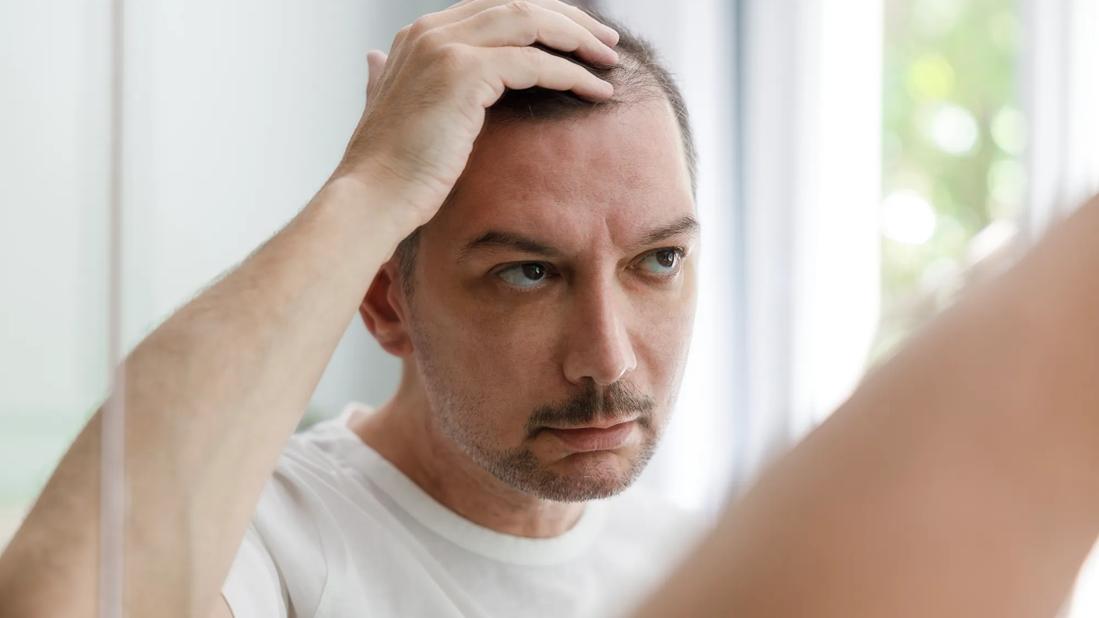Can Ozempic Cause Hair Loss?
Your body’s response to rapid weight loss from the medication may cause shedding

Weight loss is the typical goal if you take Ozempic® or some other type of GLP-1 agonist. But in some cases, people taking the medication shed more than just pounds. They also lose clumps of hair.
So, how do Ozempic, Mounjaro®, Wegovy® and similar GLP-1s cause hair loss? We asked endocrinologist Kathy Zhou, MD, to explain why it happens and how you may be able to limit the loss.
Why does Ozempic cause hair loss?
Let’s start with the basics: It’s NOT the medication itself that might cause your hair to start falling out. Instead, it can be a reaction as your body rapidly loses weight from the treatment. Basically, your system goes into preservation mode.
The same thing can happen after bariatric surgery as your body drops pounds.
“Your body can perceive weight loss as a stress,” explains Dr. Zhou. “As this happens, it begins to hold on to resources for your vital organs. It wants to protect your heart before it worries about giving you a nice head of hair.”
So, your hair may come out in large clumps that you find on your pillow in the morning. It can result in your hair looking noticeably thinner, with areas of your scalp exposed or more pronounced receding.
The official name for stress-induced hair loss is telogen effluvium, but many refer to it as “Ozempic hair” after the popular GLP-1 medication.
A few factors contribute to hair falling out after rapid weight loss.
Disruptions to the hair growth cycle
Your hair-growth cycle is made up of three phases: Growth, resting and shedding.
“Most of your hair — about 80% to 90% — is usually in a grow-grow-grow phase,” explains Dr. Zhou. “But when your body experiences a stressor, more hair gets pushed into that ‘quiet’ resting phase. From there, it’s just a few weeks to months until you start to see hair loss.”
Nutritional deficiencies
Ozempic and other GLP-1s decrease your appetite and make you feel fuller after eating smaller portions. As you’re eating less, what you munch on is very important.
“We see some people become malnourished if they’re not being intentional with their eating,” shares Dr. Zhou. “That can lead to deficiencies in protein, iron, zinc and other nutrients and contribute to excessive hair loss.”
Hormonal changes
Medications like Ozempic can indirectly affect your thyroid and hormone stability to contribute to hair loss, though it’s to a lesser degree than other potential stressors, says Dr. Zhou.
How to stop hair loss from Ozempic
Dr. Zhou estimates that 25% to 33% of people taking Ozempic and similar medications used for weight loss experience some degree of hair loss. “It’s a somewhat significant number,” she says.
What can you do to help keep your hair in place? Dr. Zhou offers these suggestions.
- Drop weight gradually. A slow-and-steady approach to weight loss can minimize the shock to your system. “You want to avoid that ‘cliff effect’ where you lose weight rapidly,” she advises.
- Focus on nutrition. Loading your plate with nutrient-dense foods — think fruit, vegetables and whole grains, plus leaner meats — can minimize protein and vitamin deficiencies that may trigger hair shedding. Talk to your doctor about supplements, too.
- Stay hydrated. Dehydration is a potential side effect of taking GLP-1s as your body adjusts to new eating and drinking patterns — and it can contribute to hair loss. Make sure you take in enough fluids.
- Work with a dermatologist. Certain products or medications may help minimize hair loss. “Dermatologists have a few tools in their tool kit that may help if you see hair loss,” suggests Dr. Zhou.
But even if you take precautions, some hair loss is still possible when taking Ozempic or other GLP-1s. “It may not be avoidable for some people,” she adds.
Is Ozempic hair loss permanent?
It may take a few months, but any hair you lose after beginning a weight-loss medication typically grows back. It’s just a matter of your body’s natural hair growth cycle restarting to replace what was lost.
“After your body experiences this stress and sheds hair, it needs to restabilize to go back into a growth cycle,” says Dr. Zhou.
If your hair loss is significant or growth isn’t restarting as expected, your doctor may recommend screenings to look for any other underlying causes, like an iron deficiency or a hormone imbalance.
Bottom line
Hair loss isn’t listed as an official side effect of Ozempic and GLP-1s by the U.S. Food and Drug Administration (FDA). But it’s a reality for many who use the medications.
“The potential for temporary hair loss is something I mention to my patients so they’re prepared for it,” says Dr. Zhou. “But it’s a tradeoff many people are willing to make when you look at the overall benefits that come with taking GLP-1s for weight loss.”